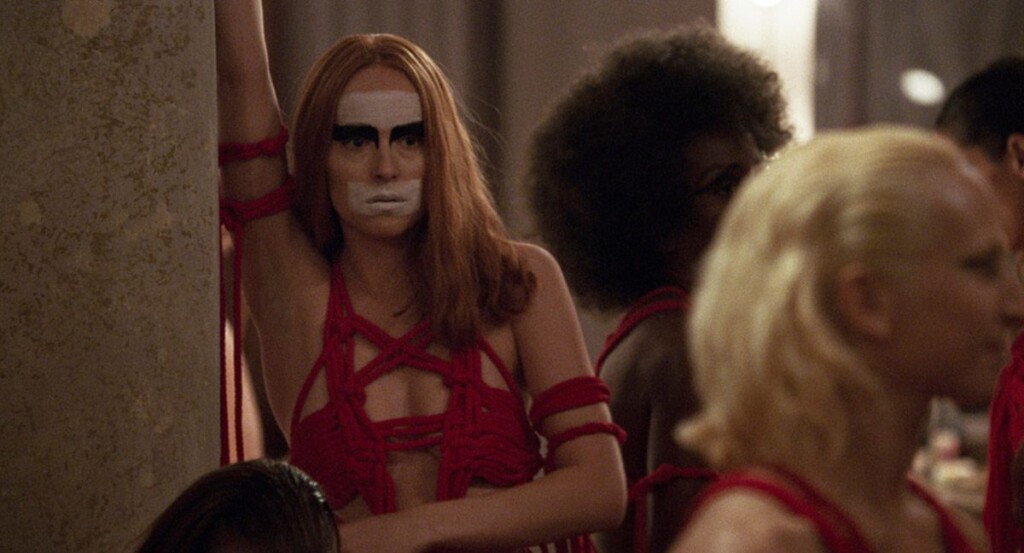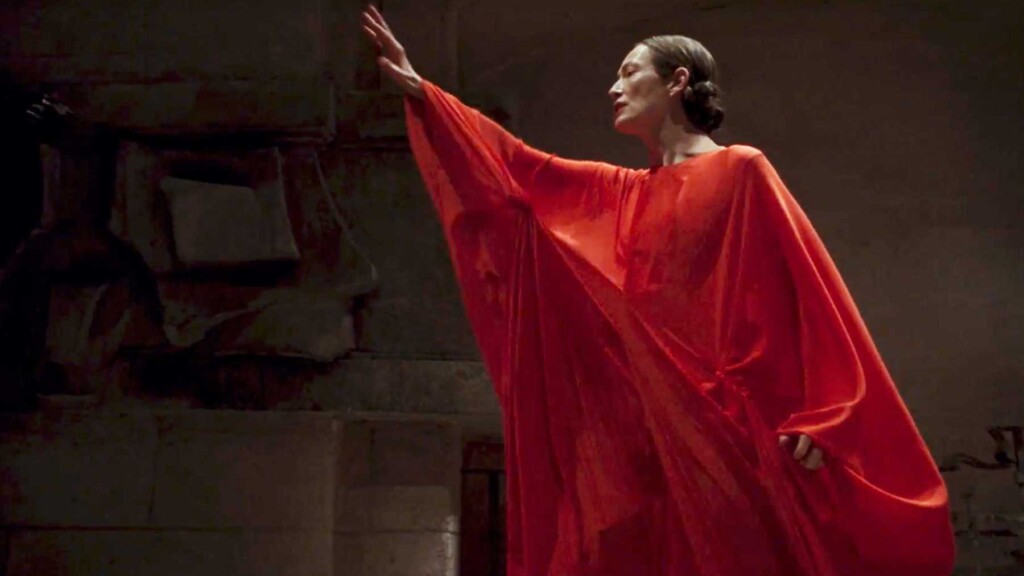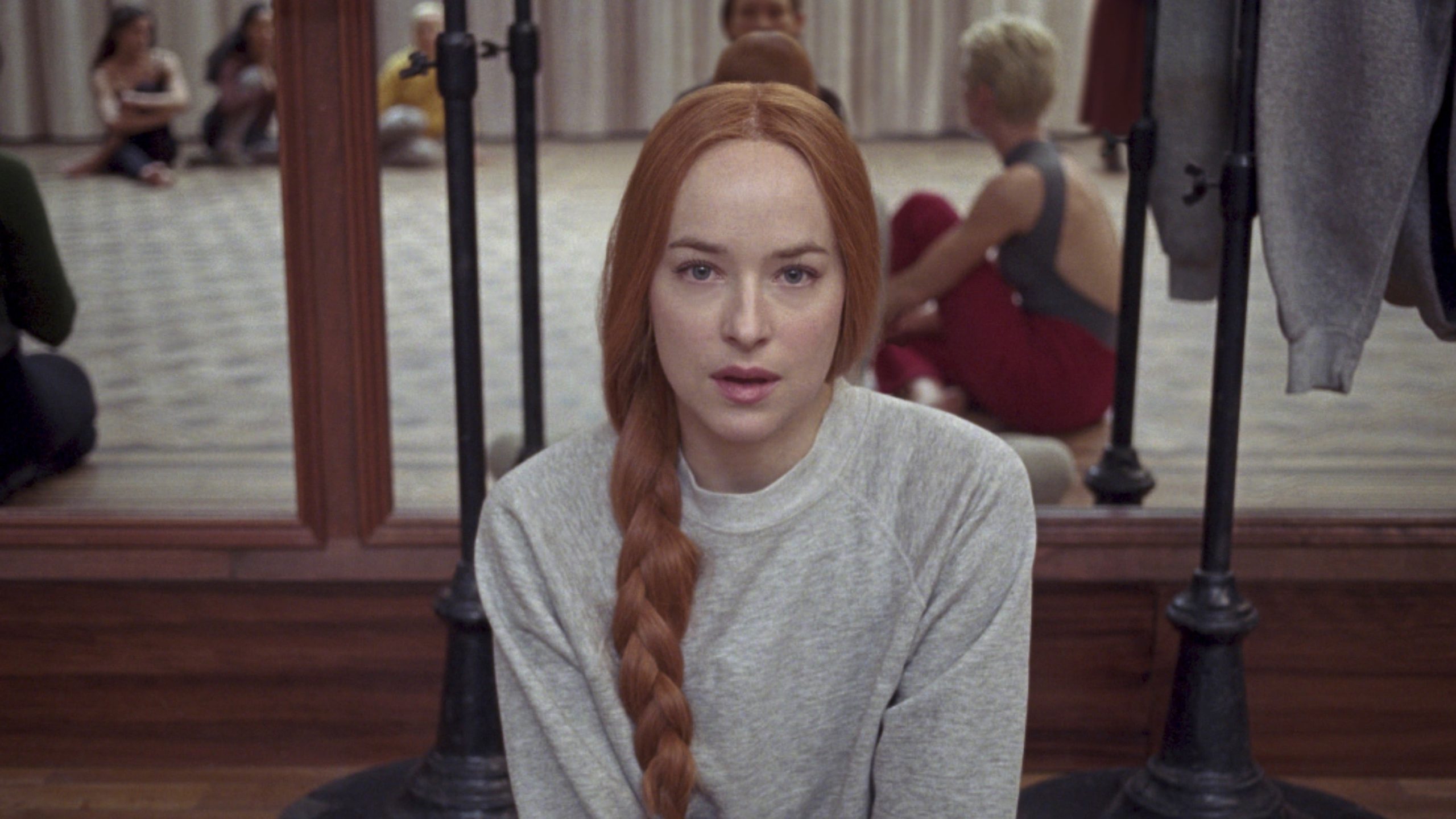“I am she.”
There are some movies that are generally considered too sacrosanct to remake. This is why we’re never getting a Casablanca with Zac Efron, and why The Social Network is the closest thing we’ll see to a twenty-first century Citizen Kane. Dario Argento’s 1977 Suspiria is not a film that defies a remake. It’s pretty to look at, sure, and has no shortage of its own eerie moments, but it’s another unfortunate case of the horror community at large thinking that something is a classic just because it’s old. Luca Guadagnino’s 2018 re-imagining of the film, though, is something of a masterpiece of depravity, lunacy, sexuality, and guilt. This is a version of Suspiria that actually has something on its mind.
Consider the opening: this film is not hermetically sealed in the dance academy, the way that Argento’s often feels. It’s defiantly set in 1977 Berlin, a town literally divided and now at war with itself. The Baader-Meinhoff riots are a felt presence throughout nearly the entire film. Patricia (Chloe Grace Moretz) is in hysterics as she visits Dr. Klemperer (Tilda Swinton, billed at Lutz Ebsendorf). “I was right,” she wails, “they’re all witches.” Patricia is a small role, but Moretz gives it her all, and Guadagnino made the right decision in casting a well-known actress to pull us into this nightmare (think Drew Barrymore in the prologue of Scream). Klemperer dismisses her ravings as no more than panic, but before he can learn any more, Patricia flees, leaving her belongings behind.

Then we meet Suzy Bannion (Dakota Johnson), and get the film’s first show-stopping scene. Unlike in the earlier film, Suzy has not already been accepted into the Markos Dance Company; she badgered the instructors for an audition until they relented. She grew up in Ohio Amish country and has no formal experience. Johnson at first plays Suzy as shy and a bit awkward, but that goes away the second she begins dancing. She’s told to dance without her accompanying music, and it’s not only hypnotic, it’s also impressive; we’re seeing not only Suzy lay her soul bare, but also Johnson’s remarkable dedication to the role. Downstairs, Madame Blanc (Swinton again), the company director, seems to sense Suzy’s presence, and she is able to witness the finale of the dance. Right away there’s a powerful connection between Suzy and Blanc, and Johnson and Swinton have brilliant chemistry together. They go beyond student and pupil, and a powerful erotic chemistry develops between the two. Look at a scene where Blanc sits on Suzy’s bed if you want to see a visual definition of “yearning.”
Suzy lands the lead role in a performance of the company’s signature dance, Volk, which gives us one of Suspiria‘s most gruesome scenes. As Suzy throws herself into the dance, another dancer upstairs is tossed around in time with Suzy’s movements. Her face is smashed into a mirror, her legs and arms bent at obscene angles, and she’s thrown across the room before collapsing into a heap. Then four women come with meat hooks to remove her. Suspiria holds nothing back; for a 153-minute movie, it is not what you would call a slow burn. Paradoxically, though, it does take its time. It gives ample room for Klemperer’s mourning over his wife; for Blanc’s increasingly powerful connection to Suzy; for Sara’s (Mia Goth) dawning realization that Patricia was right about everything.
The performances, as you’d expect from a cast like this, are terrific, and even in scenes where nothing happens, or strange sequences that are meant to challenge viewers, it’s the performances that make us care. Johnson is dazzling, fearlessly diving into an enormously challenging role with the skill and fervor of Jennifer Lawrence in mother! There is no scene that she doesn’t command, and her transformation over the course of Suspiria is as engrossing as it is inevitable. In a way, she brings to mind the similar careers of Robert Pattinson and Kristen Stewart, solid actors shackled to an execrable franchise (the Fifty Shades movies, in Johnson’s case), who then used their fame and clout to pursue whatever out-there projects they find interesting. (Daniel Radcliffe is in this group too, but as a rule the Harry Potter movies are leagues better than any Twilight or Fifty Shades movie.)
Swinton is what you’d expect, which is to say unexpected. Her dual performances are more than a gimmick. She wears what must be a horrific amount of makeup to play Klemperer (the hair and makeup artists are mentioned in the opening credits, which is rare), but she doesn’t get lost around it. Compare it to, say, Rami Malek, who had to act around prosthetics in Bohemian Rhapsody. Swinton lets us live in Klemperer’s grief, and in his obsession with finding Patricia, an ersatz daughter who he now has lost too. Goth, with her cherubic cheeks and saucer-like eyes, is quickly becoming an actress worth sitting up straighter for. Between this, High Life, and A Cure for Wellness, she is cultivating a striking screen presence that is impossible to look away from.

Suspiria is a technical marvel. It’s washed-out and bleak where Argento’s was bright and lurid, but beyond setting the two films apart visually, it lets the viewer and the characters blend into the chaos of 1970s Berlin, and the heavy clouds of residual guilt from WWII. Thom Yorke’s score is at turns moody and jazzy, and put to such satisfying use that one of the tensest sequences in the film is a dance number.
It’s the go-for-broke finale that most will remember about Suspiria, I think. It unfolds with the languid yet assured pace of a nightmare, with Johnson’s calm, powerful face presiding over the chaos. This is by far the most gruesome part of the movie, where Guadagnino most pays tribute to Argento and his body of work. What’s even more impressive is that, although we’ve known these characters for over two hours now, we’re still not sure what side to be on. The world of Suspiria is reflected in its depiction of Berlin: no black, no white, just streaks of gray.
Thursday, 10/1: Phantasm
Friday, 10/2: Frozen
Saturday, 10/3: Suspiria
Sunday, 10/4: Suspiria (2018)
Monday, 10/5: Emelie
Tuesday, 10/6: Castle Freak
Wednesday, 10/7: Session 9
Thursday, 10/8: The Texas Chainsaw Massacre 2
Friday, 10/9: We Are Still Here
Saturday, 10/10: The Changeling
Sunday, 10/11: The Bad Seed
Monday, 10/12: Verotika
Tuesday, 10/13: The Legend of Hell House
Wednesday, 10/14: Lake Mungo
Thursday, 10/15: Puppetmaster
Friday, 10/16: Marrowbone
Saturday, 10/17: A Nightmare on Elm Street 4: The Dream Master
Sunday, 10/18: Halloween 4: The Return of Michael Myers
Monday, 10/19: Sweetheart
Tuesday, 10/20: Girl On the Third Floor
Wednesday, 10/21: Behind the Mask: The Rise of Leslie Vernon
Thursday, 10/22: Triangle
Friday, 10/23: Dog Soldiers
Saturday, 10/24: Noroi: The Curse
Sunday, 10/25: Train to Busan
Monday, 10/26: Tales From the Hood
Tuesday, 10/27: Mandy
Wednesday, 10/28: Sometimes They Come Back
Thursday, 10/29: Veronica
Friday, 10/30: The Wicker Man
Saturday, 10/31: Child’s Play

